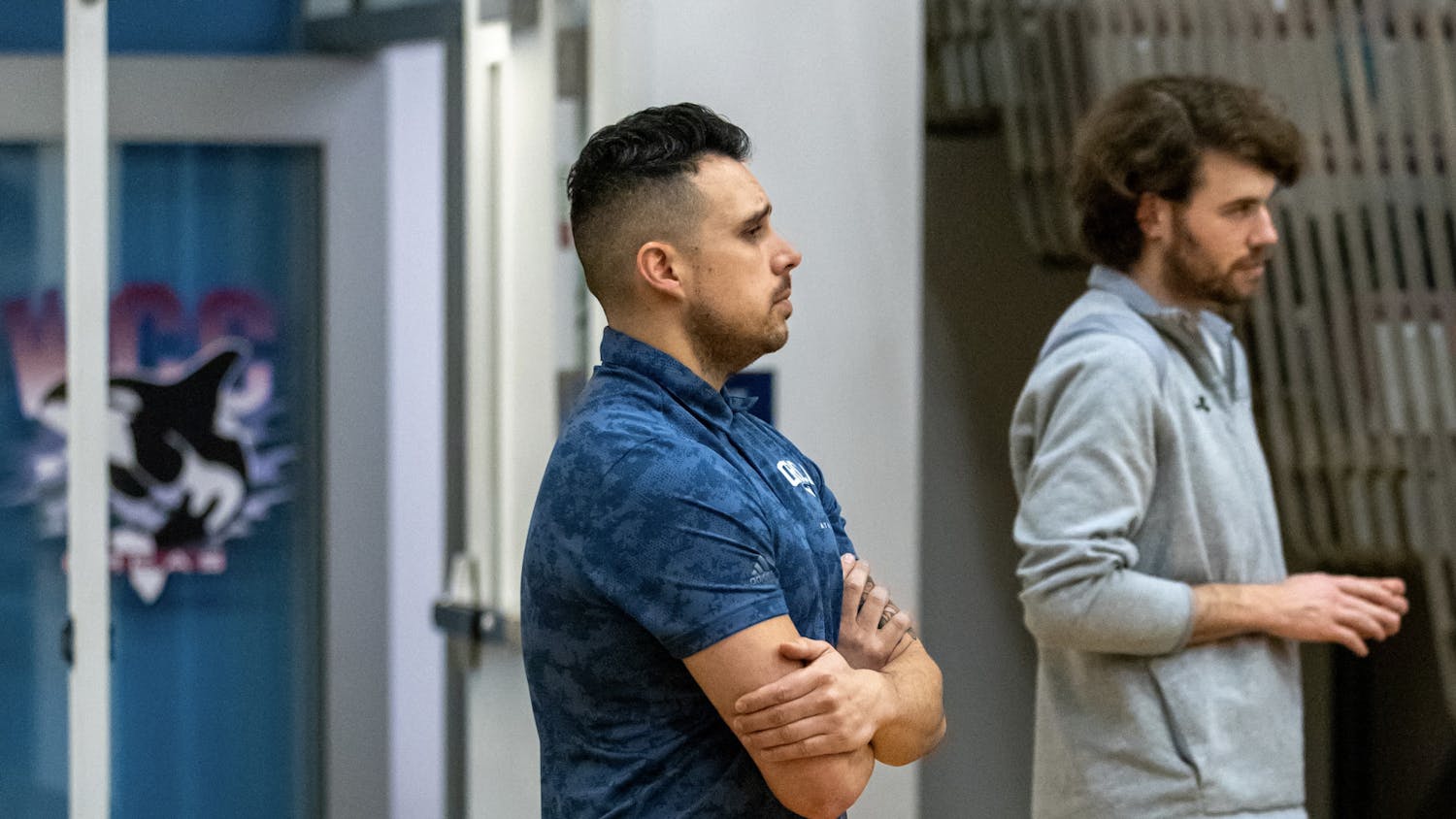 By Alex Halverson
It seems like the plot of a horrible sports movie: A basketball team has its worst season in team history, is sold to new ownership that promises the team will remain in the city and is then relocated anyway.
For fans of the Seattle Sonics, this nightmare became all too real when the team was sold to majority owner Clayton Bennett, a name now infamous for Seattle sports fans. Bennett and group of Oklahoma City businessmen moved the team to Oklahoma City in 2008, after initially promising to keep the team in Seattle.
Since then, Sonics fans and local business groups have tried to resurrect the Sonics, but to no avail.
At its meeting on Monday, May 2, the Seattle City Council voted 5-4 against a proposal from entrepreneur Chris Hansen to build a new athletic arena in Seattle. The proposed arena would have supported both the Sonics and a potential National Hockey League expansion team. Hansen’s proposal would have built the arena in the Sodo District on Occidental South Avenue.
The most recent letdown for Sonics fans comes nearly three years after the NBA Board of Governors voted on May 15, 2013, to deny the request for the Sacramento Kings to move to Seattle.
In the Seattle Times article regarding the vote, Mayor Ed Murray doesn’t abandon the effort to bring the Sonics. The Seattle Times said he “remains committed to exploring options for bringing the NBA and NHL to our region.”
The vote was the latest in a series of failed attempts to begin the process of bringing back the Sonics to Seattle.
By Alex Halverson
It seems like the plot of a horrible sports movie: A basketball team has its worst season in team history, is sold to new ownership that promises the team will remain in the city and is then relocated anyway.
For fans of the Seattle Sonics, this nightmare became all too real when the team was sold to majority owner Clayton Bennett, a name now infamous for Seattle sports fans. Bennett and group of Oklahoma City businessmen moved the team to Oklahoma City in 2008, after initially promising to keep the team in Seattle.
Since then, Sonics fans and local business groups have tried to resurrect the Sonics, but to no avail.
At its meeting on Monday, May 2, the Seattle City Council voted 5-4 against a proposal from entrepreneur Chris Hansen to build a new athletic arena in Seattle. The proposed arena would have supported both the Sonics and a potential National Hockey League expansion team. Hansen’s proposal would have built the arena in the Sodo District on Occidental South Avenue.
The most recent letdown for Sonics fans comes nearly three years after the NBA Board of Governors voted on May 15, 2013, to deny the request for the Sacramento Kings to move to Seattle.
In the Seattle Times article regarding the vote, Mayor Ed Murray doesn’t abandon the effort to bring the Sonics. The Seattle Times said he “remains committed to exploring options for bringing the NBA and NHL to our region.”
The vote was the latest in a series of failed attempts to begin the process of bringing back the Sonics to Seattle.
“The city doesn’t want to build a stadium until they have a team, but teams don’t want to come to Seattle until they have a stadium to play in.”
Senior marketing major Brendon Wilsey
The process started in 2011 when Hansen sent Seattle city officials an email stating he thought a minimally-publicly-invested arena in Seattle could lure back a team.
Hansen’s proposal for a new arena was first announced in detail in 2012 with a $500 million price tag. Of that sum, only $200 million would be paid for by city and county financing.
Hansen’s proposal was the first serious attempt to bring back the Sonics after the team had been relocated to Oklahoma City in 2008.
With the proposal of a new arena, serious rumors of the Sacramento Kings relocating to Seattle began to swirl after the Kings had trouble financing a new arena.
Seattle swooped in, and a City Council meeting in 2012 voted to approve a new arena deal with Hansen.
In 2013, the Maloof family, former owners of the Kings, agreed to sell the team to Hansen’s group, bringing even more hope Seattle would get back the team.
It was then put up to a vote for the NBA Relocation Committee, who ultimately voted it down, keeping the team in Sacramento and with its new owner, 24 Hour Fitness Founder Mark Mastrov.
Now, the move is to build an arena and bring an NBA team to it.
Senior marketing major Brendon Wilsey points out the risk involved in building a new arena in a city. “It costs a lot of money,” Wilsey said. “And the district itself isn’t like downtown where it’s busy all the time.”
Cost is a factor in everything, and finance is the argument on the side of the opposition.
“From what I understand, it’s a lot of he said/she said at this point,” Wilsey said. “The city doesn’t want to build a stadium until they have a team, but teams don’t want to come to Seattle until they have a stadium to play in.”
According to the Seattle Times article regarding the vote, Councilmember Sally
Bagshaw, one of the councilmembers who voted in opposition of vacating the street, looked to renovating KeyArena as a more cost-efficient move than building a new arena.
“[Renovating KeyArena] would cost a lot less,” Wilsey said. “I know part of the reason they’re keeping the building for Carver Gym is besides it’s historical, and it costs less to renovate.”
Renovations to KeyArena could be done for $285 million, according to a report by the AECOM global architectural firm. That price is almost half of what a new stadium would cost.
In addition to worries about how the cost of constructing a new arena could affect the city, opponents of the new arena cited traffic as another concern.
Hansen doesn’t agree.
A 2012 study analyzing sports games overlap, paid for by Hansen, showed no major effects on traffic with the arrival of a new arena.
“I don’t really see why it’d be a big problem to build a stadium right next to Safeco,” Wilsey said. “It gives us a sports district there, and there’s not much going on between Safeco and Starbucks.”
The vote against the stadium also puts the city’s pursuit of a NHL on hold.
While Seattle hasn’t had a professional hockey team since 1924, the city holds a special place in hockey history. The Seattle Metropolitans were the first American team to win the Stanley Cup Finals, the NHL’s championship, in 1917.
Hansen’s group will once again need to regroup.
“Today’s City Council vote was disappointing, but we don’t believe it is the end of the road in our quest to bring the NBA and NHL back to Seattle. We know all the fans who have stood solidly by us these past years share our disappointment, but it is important that we all stay focused on our shared goal,” Hansen posted to a Sonic’s fan page. “We now need to take a little time to step back and evaluate our options, better understand the council’s concerns and find a path forward. We will keep you posted.”
Despite the latest setback, Sonics fans remain hopeful.
 By Alex Halverson
It seems like the plot of a horrible sports movie: A basketball team has its worst season in team history, is sold to new ownership that promises the team will remain in the city and is then relocated anyway.
For fans of the Seattle Sonics, this nightmare became all too real when the team was sold to majority owner Clayton Bennett, a name now infamous for Seattle sports fans. Bennett and group of Oklahoma City businessmen moved the team to Oklahoma City in 2008, after initially promising to keep the team in Seattle.
Since then, Sonics fans and local business groups have tried to resurrect the Sonics, but to no avail.
At its meeting on Monday, May 2, the Seattle City Council voted 5-4 against a proposal from entrepreneur Chris Hansen to build a new athletic arena in Seattle. The proposed arena would have supported both the Sonics and a potential National Hockey League expansion team. Hansen’s proposal would have built the arena in the Sodo District on Occidental South Avenue.
The most recent letdown for Sonics fans comes nearly three years after the NBA Board of Governors voted on May 15, 2013, to deny the request for the Sacramento Kings to move to Seattle.
In the Seattle Times article regarding the vote, Mayor Ed Murray doesn’t abandon the effort to bring the Sonics. The Seattle Times said he “remains committed to exploring options for bringing the NBA and NHL to our region.”
The vote was the latest in a series of failed attempts to begin the process of bringing back the Sonics to Seattle.
By Alex Halverson
It seems like the plot of a horrible sports movie: A basketball team has its worst season in team history, is sold to new ownership that promises the team will remain in the city and is then relocated anyway.
For fans of the Seattle Sonics, this nightmare became all too real when the team was sold to majority owner Clayton Bennett, a name now infamous for Seattle sports fans. Bennett and group of Oklahoma City businessmen moved the team to Oklahoma City in 2008, after initially promising to keep the team in Seattle.
Since then, Sonics fans and local business groups have tried to resurrect the Sonics, but to no avail.
At its meeting on Monday, May 2, the Seattle City Council voted 5-4 against a proposal from entrepreneur Chris Hansen to build a new athletic arena in Seattle. The proposed arena would have supported both the Sonics and a potential National Hockey League expansion team. Hansen’s proposal would have built the arena in the Sodo District on Occidental South Avenue.
The most recent letdown for Sonics fans comes nearly three years after the NBA Board of Governors voted on May 15, 2013, to deny the request for the Sacramento Kings to move to Seattle.
In the Seattle Times article regarding the vote, Mayor Ed Murray doesn’t abandon the effort to bring the Sonics. The Seattle Times said he “remains committed to exploring options for bringing the NBA and NHL to our region.”
The vote was the latest in a series of failed attempts to begin the process of bringing back the Sonics to Seattle.





